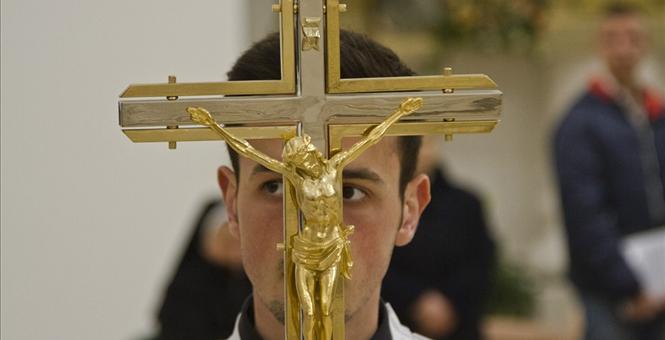Caitlin Trussell with Augustana Lutheran Church on November 13, 2016
[sermon begins after the Bible reading from the book of Luke]
Luke 21:1-19 He looked up and saw rich people putting their gifts into the treasury; 2he also saw a poor widow put in two small copper coins. 3He said, “Truly I tell you, this poor widow has put in more than all of them; 4for all of them have contributed out of their abundance, but she out of her poverty has put in all she had to live on.”
5When some were speaking about the temple, how it was adorned with beautiful stones and gifts dedicated to God, he said, 6“As for these things that you see, the days will come when not one stone will be left upon another; all will be thrown down.”
7They asked him, “Teacher, when will this be, and what will be the sign that this is about to take place?” 8And he said, “Beware that you are not led astray; for many will come in my name and say, ‘I am he!’ and, ‘The time is near!’ Do not go after them.
9“When you hear of wars and insurrections, do not be terrified; for these things must take place first, but the end will not follow immediately.” 10Then he said to them, “Nation will rise against nation, and kingdom against kingdom; 11there will be great earthquakes, and in various places famines and plagues; and there will be dreadful portents and great signs from heaven.
12“But before all this occurs, they will arrest you and persecute you; they will hand you over to synagogues and prisons, and you will be brought before kings and governors because of my name. 13This will give you an opportunity to testify. 14So make up your minds not to prepare your defense in advance; 15for I will give you words and a wisdom that none of your opponents will be able to withstand or contradict. 16You will be betrayed even by parents and brothers, by relatives and friends; and they will put some of you to death. 17You will be hated by all because of my name. 18But not a hair of your head will perish. 19By your endurance you will gain your souls.”
[sermon begins]
A week and a half ago, a new Crock Pot turned up at my house. It sat on the counter for a few days, hanging out in its box. My old Crock Pot was sitting there too. Its clouded, plastic lid cracked beyond repair. No replacement part available to prolong its use to be found online or in town. We received it as a wedding gift over 20 years ago and scooped from it many family meals and potluck offerings. It shows its years in the pale blue floral pattern and other signs of wear beyond its broken lid. Finally I pulled the new one out of its box on Tuesday morning and christened it with the evening meal. Here’s where the story takes a turn into the absurd. I couldn’t part with the old one. Besides my stubborn resistance to planned obsolescence, it is an object loaded with meaning through memories. I put it in my trunk rather than in the trash thinking that maybe I’ll discover a means to reuse or repurpose it. That was Tuesday.
On Wednesday morning, post-election, sentimentalism was put in its proper place. Facebook was exploding in surreal contrasts of joy and despair. It’s a wonder that my laptop didn’t split apart from the emotional output of so many people. I looked at my laptop and wondered about all these people who were posting – family, friends, fellow clergy, and friends-of-friends. Many of them I know and love.
So, there I sat, wondering if there was anything to say, if I had anything to say. So, I did what I often do which is go to my faith. And I also did what a lot of people in my generation do and wrote a blog post.[1] It was a mixture of testimony and confession. That is to say, I wrote about my experience, Jesus, and what I was going to do by faith in the cultural turmoil even if not much else seems clear.
In the Bible reading today, Jesus tells his disciples that they will have an opportunity to testify. Their opportunity to testify will come in times of massive upheaval as they’re arrested. Some of them may not make it. Some may die. Jesus’ words are dire as they describe a dire time. Their faithful testimony will not inoculate them against disapproval or death at the hands of kings or governors.
Generally speaking, testimony isn’t a big part of Lutheran-land. It’s found a lot more in other Christian traditions. Testimony is even odder when it’s given in non-Christian arenas like to the kings and governors. Jesus tells his disciples that he will give them the words and wisdom for their testimony.
Right before this call to testimony, Jesus watches the widow walk humbly across the floor of the synagogue and put all that she has to live on in that treasury box. Her presence is noted as Jesus watches her quietly give her gift. Jesus’ witness means we remember her across time as an image of active trust in God. She is identity bearing for us as the church. As one congregation of people in God’s whole church catholic, our mission statement concludes with the words from the prophet Micah.[2] We “walk humbly with our God.”[3] We walk as the widow walks – right through the argument of the leaders. We do as the widow does – giving our lives to God.
In contrast to the widow, we live in a world where politics often supplants faith as salvific. Politics becomes that which will save us from all manner of bad things. Bishop Elizabeth Eaton reminds us in her post-election remarks this week that, “No human candidate can guarantee our life and our future, that is the work that God has done through the death and resurrection of Jesus.”[4] While many of us may agree with that statement theoretically, our minds and bodies may have a more difficult time figuring out what it means. Especially because there are competing and emotionally-charged political views of people we’re sitting in the pews with right now. If the last few days are any indication, some of us are celebrating and some of us are afraid. That’s a lot going on in a room of people much less a country of people.
Leading with the story of the widow, Jesus charges his disciples to give their testimony and tells them that it may cost their lives.[5] If we only had this reading, one could read this as a speech of indifference as to whether or not the disciples live. But nothing could be further from the good news of Jesus. In the first chapter of Luke, God slips on skin in solidarity with us[6]; Mary sings about God lifting up the lowly and filling the hungry with good things[7]; and Zechariah prophesies about forgiveness of sins and the tender mercy of God giving light to those who sit in darkness and guiding our feet in the way of peace.[8] Divine indifference is not a thing. After Luke’s 21st chapter that contains the Bible reading today, come the last three chapters that include Jesus’ trial, death, and resurrection during which Jesus’ prays for the people, “Father, forgive them; for they do not know what they are doing.”[9] Divine indifference is not a thing.
Bishop Eaton continued her post-election comments: “So what do we do dear church? Three things. Remember that all human beings are made in the image of God, even the ones who didn’t vote for your candidate. Pray for our country, for those elected, for understanding. And then we get back to work, doing the things the church has always done: welcome the stranger, feed the hungry, clothe the naked, visit the sick and those in prison, work for justice and peace in all the earth, all in the name of the one who is our hope, our life, and our peace, Jesus who set us free to serve the neighbor.”
Following up on Bishop Eaton’s question, I ask us, “How are we prepared to do these things, dear church?” Our testimony on behalf of the stranger, the hungry, the naked, the sick and the imprisoned need not wait until we’re dragged before a king or other world leader. There are people right now who are riding the coattails of this election to intimidate and injure others.[10] Swastikas and racist behavior are being reported by schools from around the country.[11] We may testify right now against racist, sexist, and homophobic behavior – prepared by Jesus with the words, wisdom, and strength to do so on behalf of all people, ALL beloved children of God.
Healing prayers have been long-scheduled for worship this Sunday. Post-election, this now seems like providential timing – not to gloss over serious realities with sentimentalism but rather to be gifted strength to respond faithfully, to love our neighbor as ourselves.[12] Because divine indifference is not a thing. In its ministry of healing, the church does not replace the gifts of God that come through the scientific community, nor does it promise a cure. The church offers and celebrates gifts such as these: God’s presence with strength and comfort in time of suffering, God’s promise of wholeness and peace, and God’s love embodied by the community of faith.[13]
Jesus’ death on the cross is evidence that God would not raise a hand in violence against the people God so loves. Claimed by this good news, we are set free to give our lives to God for the sake of our neighbor. Because of Jesus the Christ, the church’s indifference is not a thing. Indifference is not an option. Where people are hungry and thirsty, where people are suffering and hurting, where people are persecuted and threatened, Jesus people show up. Thanks be to God.
[1] “Tinted Purple” blog post link: http://caitlintrussell.blogspot.com/2016/11/tinted-purple.html
[2] Micah 6:8 – He has told you, O mortal, what is good; and what does the Lord require of you but to do justice, seek kindness and walk humbly with your God.
[3] Augustana mission – Guided by the Holy Spirit we gather in Christian community, reach out and invite, offer hope and healing in Jesus Christ and walk humbly with our God. http://www.augustanadenver.org/
[4] Presiding Bishop Elizabeth Eaton, Evangelical Lutheran Church in America. https://www.youtube.com/watch?v=Nw2-f82fklc
[5] The Book of Acts tells stories of the disciples’ work, testimony and martyrdom.
[6] Luke 1:26-38
[7] Luke 1:46-56
[8] Luke 1:67-79
[9] Luke 23:34
[10] Jim Axelrod for CBS News on November 11, 2016. “Ugliness Sprouting Up Across The Country.” http://www.cbsnews.com/news/ugliness-sprouting-up-across-country-after-donald-trump-election-win/
[11] CBS News/AP on November 11, 2016. “Schools Nationwide Report Racially-Charged Incidents After Election.” http://www.cbsnews.com/news/schools-nationwide-report-racially-charged-incidents-after-election/.
[12] Luke 10:27
[13] Evangelical Lutheran Worship. Opening Rubric of “Brief Order for Healing.” (Minneapolis: Augsburg Fortress, 2006). members.sundaysandseasons.com/library


